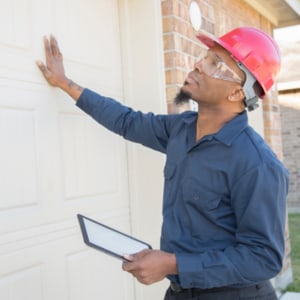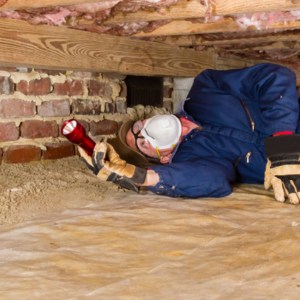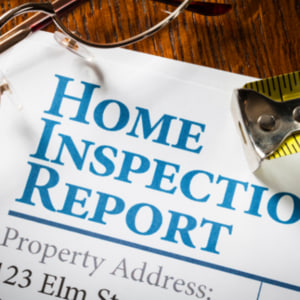
Home Inspections 101
August 10, 2021
You’ve found the one – the perfect house. Excitement about your new home builds as you picture in your mind where the new sofa or a treasured heirloom will fit. The seller is happy to have a qualified buyer and anxious for closing. Everyone is happy. Enter the home inspector whose mission is to find flaws in your perfect home and possibly create a bit of tension between buyer and seller.
A home inspection is the buyer’s tool in identifying a home’s potential before closing. Realtors® almost always recommend – and some lenders require – a professional home inspection within a specified time period after agreeing to purchase.
Here’s a crash course on the basics of home inspections.
Include an Inspection Contingency

An inspection contingency clause in your contract is your protection plan since you likely had a superficial view of the home you’ve agreed to buy. The clause allows a specific time period for you to have the home professionally inspected for current and potential problems and to notify and negotiate with the seller for needed repairs. You can negotiate with the seller on the needed repairs, or the seller may agree to a lower price to accommodate the cost. If the seller chooses not to make repairs or lower the price, you have the option of waiving the repairs or backing out of the purchase. The contingency clause is important because it allows you to recover any earnest money paid if the seller will not make major repairs.
In today’s extreme sellers’ market, some buyers choose to forego the inspection contingency, if their lender will allow, or to pay for repairs themselves. Waiving the inspection contingency can make one buyer’s offer more attractive than others in a multiple offer scenario but comes with the risk of purchasing a house with unknown issues. Sellers are also less willing, in a competitive market, to fork over the cash to make identified repairs leaving buyers in a take-it- or-leave-it position.
Hire a Pro

The buyer chooses and pays for the home inspection. That’s important because the inspector should work for you and, if there is an issue after closing, his liability is to you – not the seller. Realtors® usually have a list of licensed inspectors in the area and you can certainly choose from one or two on the list. Consumer Reports suggests contacting more than one inspector to ask for a copy of a recent inspection for a home similar to the one you’re purchasing. “After comparing reports from several inspectors, you’ll begin to see which ones are detailed in their observations and which are just filling their reports with generic information such as the importance of sealing a wood deck or caulking around windows to improve energy efficiency.”
Once you have recommendations and referrals consider these factors:
- Experience - How many years have they been in the business and how many inspections do they do a year?
- Specialty - Choose someone who specializes strictly in home inspections.
- Reporting – What type of report can you expect – written or electronic – and when?
- Certifications – Is the inspector American Society of Home Inspectors (ASHI) certified?
- Insurance - Does the inspector have Errors and Omissions Insurance to protect you if something major is overlooked?
Finally, the U.S. Department of Housing and Urban Development suggests Ten Important Questions to Ask Your Home Inspector.
Understand the Scope

Expect a good home inspection to take two to four hours depending upon the size and age of the home. Your home inspector likely will outline the scope of his work in an agreement that also details what and when to expect a report.
A good home inspection should include an assessment of:
- Roof
- Crawl space and attic
- Heating and cooling system
- Electrical panels, outlets, and switches
- Windows and doors
- Walls, ceilings, and floors
- Water pressure and drainage
- Toilets, bathtubs, sinks, and showers
- Chimneys and flues
- Exterior damage, decay, and settling
- Garage doors
- Grading and exterior drainage
Using modern technology, inspectors can employ:
- Drones for a birds-eye and close up view of a steep roof
- Thermal imaging to detect energy loss, electrical hot spots, plumbing leaks, and unseen moisture damage
- WIFI lighted scopes to reach and video hard-to-reach areas
- Electric voltage and current testers
- Indoor air quality/mold sampling equipment
- Radon detectors
- Digital air flow meters to test the velocity of airflow and venting
Keep in mind that the inspector’s role is to detect, not remedy. Don’t expect the inspector to open walls to determine the source of an identified problem.
Plan for the Cost

The old adage, “you get what you pay for,” applies here. Though homebuyers may be reluctant to spend the extra cash, this is not a place to cut corners. Expect to pay between $300-$500 for a thorough inspection, according to the U.S. Department of Housing and Urban Development. The cost will depend on the size of the home, its location and any special requirements such as a septic system, out building or private well.
Some inspections are performed separately and at additional cost. Plan to pay extra for a termite inspection or for an Exterior Insulation Finishing System (EIFS).
Keep the Inspection Report

Every home – even new construction – has flaws. The goal of the inspection is knowledge. Since a home purchase is one of your most important investments, use the inspection and report like an owner’s manual for your new home. Even better – be present at the inspection so you can see first-hand the process and learn more about the home’s important systems. You’ll have a better understanding of their age and condition so your new home will remain your dream home.